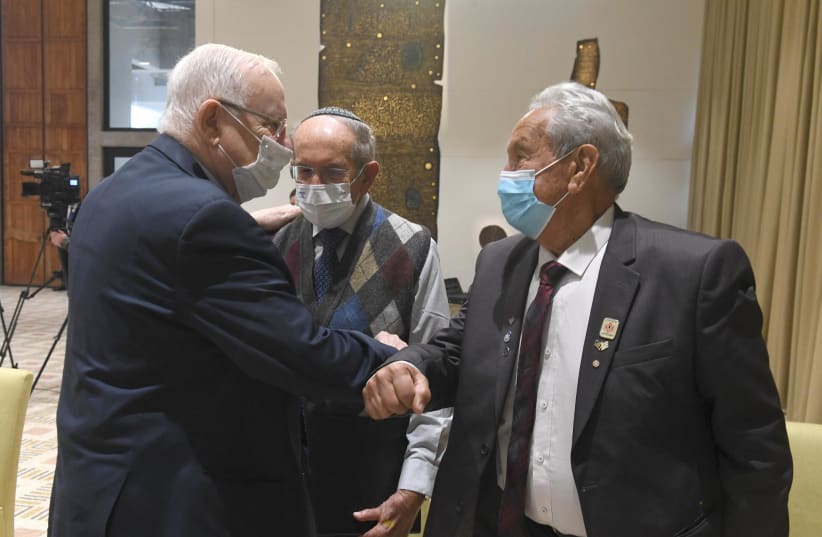President Reuven Rivlin on Monday hosted the 90th anniversary celebration of Irgun Zvai Leumi, generally known by its Hebrew acronym of Etzel.
Its name translates as the National Military Organization. It was one of three major clandestine paramilitary organizations opposed to the rule of the British Mandate in what was then Palestine.
A breakaway movement from the Hagana, Etzel’s ideology was based on the teaching of Ze’ev Jabotinsky. It functioned from 1931 to 1948, and in the final years of its operations fought the Arabs.
For many years it was viewed by the British as a terror organization.
It was headed by a series of supreme commanders, the last of whom was Menachem Begin, who led it from 1943-1948.
Etzel is most famously known for the bombing of the King David Hotel on July 22, 1946. As a result, 91 people were killed and 46 injured. The hotel served as the headquarters of the British High Command.
Coincidentally, the 90th anniversary of the Irgun was celebrated on the same day as Ambassador Mohamed Mahmoud Fateh Ali Al Khaja of the United Arab Emirates arrived at the King David for a four-day stay. Later in the day Khaja presented his letters of credence to Rivlin.
Many years ago, when Begin was invited to address a meeting of the United Jewish Appeal at the King David, he was introduced as “the man who blew up this hotel.” In fact, Begin had tried to avoid bloodshed, and had instructed that a telephone warning be delivered to the hotel at approximately half an hour prior to the explosion. The British claimed that no such warning had been received.
After the State of Israel came into being, Begin evolved from a paramilitary leader who had stopped a civil war into a political leader of Herut, which formed an alliance with the liberals leading to the creation of Gahal, which ultimately became Likud, with the party’s core principles based on Ze’ev Jabotinsky’s values.
The memorial event began with a black and white documentary film on Jabotinsky, who founded the right-wing Zionist youth movement Beitar, and the political Revisionist Movement. The introductory soundtrack to the film was the Betar anthem.
At the memorial ceremony itself, all present were asked to rise and sing the anthem.
Rivlin, who is a lifelong disciple of Jabotinsky, a former Beitar and former Likud MK, made no effort to disguise his pleasure at having yet another opportunity to speak about his ideological hero.
What he had learned from Jabotinsky, said Rivlin, was that it was permissible to think differently.
He was alluding to the fact that up until 1977, Israeli politics had been dominated by Labor.
Referring to the generation of the underground paramilitary organizations, Rivlin said that these organizations had all been headed by great leaders “of the resurrection of our nation,” who were people of vision, without whose courage and heroism there would be no State of Israel. Rivlin credited the underground paramilitary movements with the secret of their courage, which is rooted in camaraderie and humanity, and serves as a legacy for today’s military forces.
Etzel veteran Shlomo Goldhor, who chairs the Association of Etzel Fighters, made particular reference to two Etzel leaders: David Raziel, whom he described as “a revolutionary thinker and strategist,” who had studied for several years at Mercaz Harav with Rabbi Zvi Yehuda Kook as his study partner; and Menachem Begin, who went on to lead the nation.
Goldhor also spoke of the “extraordinary connection” between Lehi founder Avraham Stern, who had been a soul mate of Raziel’s until he broke away from Etzel in 1941, the same year that Raziel had been killed in Iraq, when a Luftwaffe plane strafed the car in which he was traveling.
Prof. Arye Naor, who chairs the academic committee of the Jabotinsky Institute, had a very personal connection with the event. He is David Raziel’s nephew, and also the son of Esther Raziel-Naor, who was a member of Etzel, and later a Herut representative in the first Knesset.
Arye Naor himself served as cabinet secretary during the Begin administration. He provided anecdotes about his uncle and his mother not only from a politically ideological perspective, but also as items culled from a family treasure trove of memories.
Herzl Makov, executive director of the Menachem Begin Heritage Center, outlined the February 1944 revolt against the British, and made the point that Begin, as a strategic visionary, looked always to the future from a national standpoint and not from a personal one.
